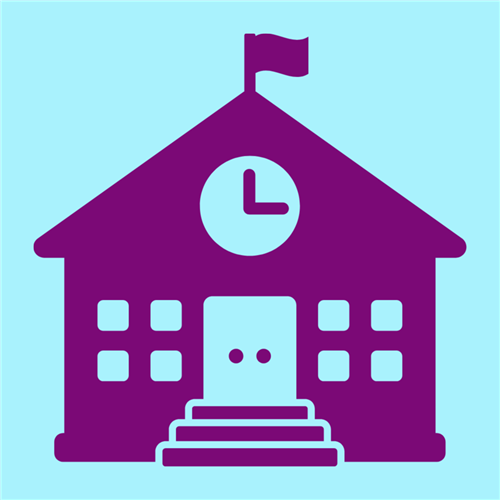- Academics at Plano ISD
- Special Education Continuum of Services
-

Special Education Continuum of Services
Because Plano ISD values equity of access for all, students with disabilities are educated in their least restrictive environment. General education curriculum is the foundation for all instructional programs, and planning for a student’s Special Education program begins on the student’s home campus. The Full and Individual Evaluation, along with current information regarding present levels of academic achievement and functional performance form the basis for decision-making by the Admission Review and Dismissal (ARD) Committee who determine specific services needed by individual students. The Full Individual Evaluation includes recommendations that cover a student’s next 3 years of growth. Services are individually determined for each student with a focus on enabling students to access and progress through the general education curriculum.
A full continuum of instructional and related services are available to eligible students in the least restrictive environment, with initial consideration given to provision of services in the general education classroom to the greatest extent possible. Students may spend varying amounts of time in general education and Special Education settings, based on their specific needs and present levels. Special Education instructional services are available on every campus. In addition, district-wide instructional and related services are provided to eligible students. Most students receiving Special Education services attend their home campus, but additional programming options are available across the district.
Continuum of Services
-
PROGRAM DESCRIPTIONS BASED UPON LEAST RESTRICTIVE ENVIRONMENT
Least Restrictive Environment: Considerations of Student Services and Placement in Least Restrictive Environment
Supplemental Aids and Services

What supplemental aids and services can be utilized in the general education environment for the student to make progress in academic instruction and annual goals?
Examples: Visual aids, checklists for work completion, adaptive equipment, social skills instruction, FM system, alternate ways to show standards, etc. Accommodations change HOW the student accesses grade-level TEKS without changing the standard
Training and Support

Is there a need for instructional personnel, related service staff, or parent/guardian training in order for the student to make progress in their educational environment and annual goals?
Examples: Training for general education teacher(s), training for Special Education teacher(s), training for related service providers, training for campus administration, etc.
Staff Support

What Staff is required to implement the student’s IEP in order for the student to progress in their academic instruction and make progress on their annual goals?
Examples: Collaboration and co-teaching with General Education and Special Education teachers, inclusion support with Special Education teachers, inclusion support with Special Education paraprofessionals, district-provided training, etc.
Curricular Adjustments

Are curricular adjustments required for the student to participate, engage, and make progress in the General Education environment and annual goals?
Examples: General Education curriculum and assessments are modified based on ARD committee decisions. Modifications change WHAT the student is expected to learn, accessing TEKS standards below grade level that support the student making progress towards grade-level standards.
Instructional Arrangement

Does the student’s level of academic instruction, intensity of behavior, or requirement for functional skills necessitate a special education placement for services based on data over a period of time that includes prescribed interventions?
Examples: General Education with inclusion support, resource classroom, self-contained, alternate campus, non-district placement.
-
Instructional, Related, and Transition Services
Students may qualify for additional services such as Adapted Physical Education, Assistive Technology, Audiology, Counseling, Deaf and Hard of Hearing, In-Home and Community-Based Training, Parent/Family Training, Music Therapy, Occupational Therapy, Physical Therapy, Speech Therapy, Transportation, and Vision Services.
-
Early Childhood Services
EARLY CHILDHOOD SPECIAL EDUCATION* (ECSE) | provides educational and support services for children ages 3-5 with identified delays in one or more of the five developmental areas. These developmental areas include motor, social/emotional, self-help, communication, and pre-academic skills. Students are eligible for services on their third birthday, regardless of when the birthday falls within the school year. If eligible, students 0-3 years of age who have vision and hearing impairments may begin services from birth. Children may receive services in a variety of settings, dependent upon the unique needs of the child.
* A full spectrum of classes is offered at ECSE including Speech Therapy by appointment, Preschool, Bilingual, Communication, ELC, ALC, Strive, Focus and ECSE classes. All of these services are provided at the Early Childhood Schools (Beaty, Pearson, and Isaacs).
-
General Education Setting with Inclusion | In-District, On-Campus
INCLUSION | Students may receive all or part of their instruction in a general education classroom with support from Special Education and related service personnel. The student's general education classroom teacher is a critical component in the instructional process. Qualified Special Education personnel are involved in the implementation of the student's IEP within the general education setting.
-
Special Education Setting | Resource
RESOURCE | Students requiring specially designed instruction (SDI) beyond what can be provided in a general education classroom may receive instruction in a Special Education setting. The amount of time a student spends in this setting varies depending on the student’s specific needs. A student may receive instruction in a Special Education classroom for a portion of any academic subject and the rest of instruction in general education classes. Behavior supports can be provided in the resource environment based on the student's prescriptive ARD.
-
Special Education Setting | Alternate Curriculum & Functional Skills Development Classrooms
ELEVATE | Alternate Curriculum (Campus Based ECS-12)
The Elevate classroom serves students requiring specially designed instruction (SDI) at the prerequisite level beyond what can be provided in a general education or resource classroom. Students receive the majority of their core academic instruction in the Elevate setting. This classroom is designed to address functional academics, social skills, communication, self-advocacy, daily-living skills, and independent or interdependent living skills. Student schedules are individualized and inclusion in the general education classroom is based on the individual student.
RISE | Structured Classroom (Centralized ECS-12)
Students served in the Rise classroom typically are significantly impaired in multiple areas of cognitive functioning and have areas of behavioral and/or emotional regulation deficits. Students in the Rise classroom are instructed on an alternate curriculum. Instruction is provided in the Rise classroom using highly structured, layered systems of support. Students in the Rise classroom typically have a relative strength in verbal social abilities (as compared to cognitive skills), but still require targeted social skills instruction delivered through both direct instruction and incorporated throughout the day to promote generalization.
STRIVE | Structured Classroom (Centralized ECS-12)
The Strive structured classroom is a specialized program for students that typically have a disability that significantly impacts their functioning in all areas such as, cognitive skills, communication, adaptive behavior, social emotional skills, and academics. Students in Strive need a highly structured environment to support their behavioral or functional progress. Instruction in the Strive classroom uses structured behavioral and academic supports including visual schedules, functional communication training, defined physical boundaries, and integrated sensory supports.
-
Special Education Setting | Sensorimotor Learning Classrooms
ALC | Active Learning Classroom (Centralized ECS-12)
Students served in the ALC classroom have significant cognitive delays and sensory motor differences, coupled with low incidence disabilities impacted by developmental delays in all areas. Students served in the ALC have medical and/or personal care needs that require intensive direct support. Instruction in the ALC is focused on teaching initiation, sustained engagement, communication, proximal development, and promotes functional access to the learning environment. The goal in an ALC is to learn to engage and develop understanding of reliable routines that support the ongoing care and quality of life for each student, while also addressing the many physical and occupational needs in order to enhance interactions with the environment in meaningful ways. (PK-12)
ELC | Experiential Learning Classroom (Centralized ECS-12)
Students served in these classrooms have significant cognitive delays, display needs within the sensori-motor stage of development, require communication supports, and have adaptive delays which require an alternate curricular approach. Instruction in the ELC is focused on teaching pivotal responses, socialization, communication, daily living and self-help skills; as well as functional application of academics which is vertically aligned to standards based instruction. The goal in an ELC is to learn to initiate, which is a prerequisite for social development and independence in order to gain access to an integrated community, domestic, recreational and vocational activities. Students are supported by adults and non-disabled peers in campus and class activities that will enhance their individual goals and provide opportunity for inclusive learning and instruction. (PK-12)
-
Special Education Setting | Behavior Intervention Programs
FOCUS | Intervention Program (Campus Based ECS-12)
This specially designed instructional (SDI) programming provides academic and behavioral intervention to students with significant social, emotional and behavioral deficit skills. These students demonstrate a need for targeted and individualized social and behavioral interventions by highly trained staff. In addition to the general education curriculum, these students receive social skills instruction targeted to risk factors, self regulation and de-escalation strategies, personalized procedures for coping in high stress situations, and reinforcement systems to increase skill utilization.
ACHIEVE | Intervention Classroom (Centralized K-12)
Achieve classrooms are designed to provide more intensive support to students demonstrating a higher intensity, frequency, and/or duration of social/emotional/behavior difficulties. The purpose of Achieve’s intensive level of support is to target behaviors that are interfering with the student’s ability to be successful in the general education environment even with specially designed instruction (SDI) or Focus support. Students are typically able to participate in some activities and classes with their non-disabled peers.
CONNECT | Intervention Classroom (Centralized K-12)
The Connect classroom provides services for students who access the general education curriculum, but who demonstrate significant needs in areas of social communication and behavior. These students require a highly structured learning environment due to significant social communication, social interaction, and behavioral needs. This classroom setting includes intensive social skill instruction, behavior support strategies, and concentrated academic instruction based on the individual needs of students. Students are typically able to participate in some activities and classes with their non-disabled peers.
-
Special Education Setting, Regional Day School Program for the Deaf (RDSPD) | In-District, Pearson, Davis EL, Haggard MS, Vines HS, and Plano Senior High
The Plano Regional Day School Program for the Deaf is a shared service arrangement (SSA) which provides educational services for students who are deaf and hard of hearing who reside within one of the SSA member districts. Any student whose deafness severely impairs the processing of linguistic information through hearing, even with recommended amplification, and which adversely affects educational performance shall be eligible for consideration for the services provided by PRDSPD.
-
Special Education Setting | Solomon Center for Adult Transition, 18+ Services
Students who have earned the required high school credits but have not yet met graduation criteria are provided post-high school services that emphasize preparation for adult life following graduation. The goal of the Solomon Center for Adult Transition is to provide students with an age appropriate post-high school educational experience that promotes independence and life-long learning through the use of community based vocational, independent, and social integration activities. Services are individualized to meet the needs of each student. These services result in the student attaining employment, developing personal care and safety skills, volunteering, and accessing community resources. Instruction engages students with a variety of environments, including community based recreation and leisure, work sites, public transportation, and adult learning institutes.
In addition to programming offered at the Solomon Center, students also have the opportunity to apply for the Project Search program. Project SEARCH is a one-year internship for students in their last year of public school. The program identifies students for which competitive employment is the goal, are chosen for Project Search based on an application and hands on interview process.
Adult students may fulfill graduation requirements up to or prior to 22 years of age at which time services would cease. (age 18 to age 22)


